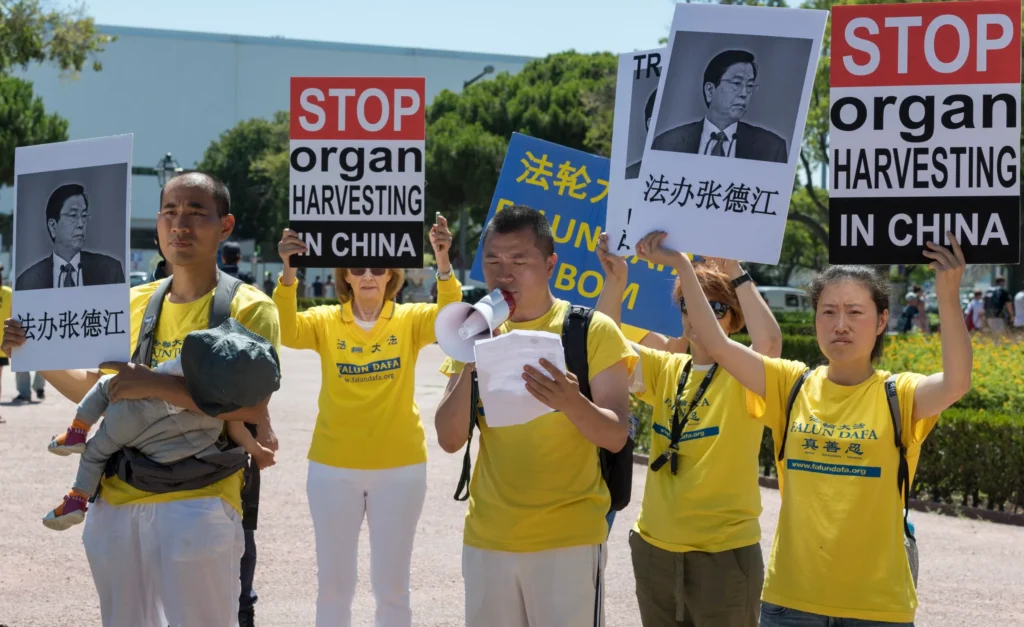The U.S. Congress has once again introduced the “Falun Gong Protection Act.” This bill will impose sanctions on the masterminds and accomplices involved in forced organ harvesting, particularly the crime of harvesting organs from living Falun Gong practitioners and committing murder on demand to profit from organs.
The “Falun Gong Protection Act” also requires the U.S. Secretary of State to report to the U.S. Congress on the policies and activities related to organ transplantation in China (the Chinese Communist Party – CCP).
The bill was introduced by Republican Congressman Scott Perry of Pennsylvania and Republican Senator Ted Cruz of Texas in their respective chambers on February 24 and March 3.
The U.S. policy outlined in the bill is as follows:
- As long as the CCP remains in power, cooperation with the People’s Republic of China in the field of organ transplantation will be avoided.
- Appropriate measures, including sanctions, will be implemented to end the CCP-supported and state-promoted organ harvesting campaign.
- The U.S. will cooperate with allies to expose the CCP’s suppression of Falun Gong, coordinate with the international community, impose targeted sanctions, and limit visas as necessary to prevent the CCP’s organ harvesting crimes.
For individuals involved in harvesting organs from living Falun Gong practitioners, the bill specifies sanctions related to both economic penalties and visa restrictions.
The bill requires the president to provide relevant U.S. Congressional committees with a list of individuals who intentionally and directly participate in, or assist with, non-consensual organ harvesting within 180 days of the bill’s enactment.
Those on the list will face sanctions, including economic penalties, asset freezes, and entry bans to the U.S.
For individuals on this list, the bill utilizes the “International Emergency Economic Powers Act” to apply civil or criminal fines up to $1 million and 20 years in prison. Civil fines can be as high as $2.5 million or double the amount of organ trade, whichever is greater.
The bill also mandates that the U.S. president updates the list at any time during the five-year term as required by the bill, with a minimum update frequency of once a year.
According to the bill, the U.S. Secretary of State must submit a report to Congress detailing the organ transplantation situation in China, including the number of organs, the sources of the organs, and the timeline for Chinese medical facilities finding matching organs.
Bipartisan lawmakers in both houses of Congress support the bill. Senator Cruz told Epoch Times in an email statement that the CCP’s suppression of Falun Gong practitioners is a violation of religious freedom and human rights.

He stated that the CCP-backed organ harvesting industry should have been eliminated long ago. He called on his colleagues to join him in fighting against these human rights violations and ensure that the CCP is held accountable.
The bipartisan co-sponsors of the “Falun Gong Protection Act” also include Republican Congressman Ron Johnson of Wisconsin, Republican Congressman Rick Scott of Florida, and Republican Congressman Thom Tillis of North Carolina.
Congressman Perry also sent an email to Epoch Times, emphasizing that as the beacon of freedom worldwide, the U.S. cannot remain silent while the CCP tortures, imprisons, and forcibly harvests organs from Falun Gong practitioners in a systematic manner.

He added that the CCP and its supporters must be held accountable for these brutal actions.
The House version of the bill was introduced by lawmakers from both parties. Democratic Congressman Pat Ryan from New York also told Epoch Times that we must do everything we can to hold the evil forces of the CCP and the organ traffickers accountable for their horrific crimes.
He expressed his honor in co-leading this bipartisan bill, calling it a major step forward toward this goal. He said he will continue to resolutely oppose human rights violations and religious suppression, no matter where they occur.
If the “Falun Gong Protection Act” is passed by both houses of the U.S. Congress and signed by the president, it will become law and take effect immediately.
The bill also grants the U.S. president the authority to waive sanctions for certain individuals based on national security and humanitarian considerations. However, the president must report to Congress every four months on the use of the waiver.
U.S. Congress Reintroduces the Falun Gong Protection Act
In the previous Congressional session, a version of the “Falun Gong Protection Act” was introduced by Congressman Perry and passed by the House of Representatives in June 2024. The Senate version was introduced by Republican Senator Marco Rubio of Florida but was not considered in time due to the U.S. presidential election.

The U.S. House of Representatives passed the Falun Gong Protection Act: A historic step. Foreign policy and human rights are Senator Rubio’s areas of expertise in the U.S. Senate. He is currently the U.S. Secretary of State. He and his colleague Cruz continue to work on human rights issues in China in the Senate.
Like Senator Rubio, Senator Cruz is a prominent voice in the Senate, condemning the CCP’s human rights violations against religious groups. Senator Cruz was re-elected in November last year and began his third six-year term in the Senate this year.
Last July, on the 25th anniversary of the CCP’s crackdown on Falun Gong in China, Senator Cruz wrote a letter in support of Falun Gong practitioners in Texas.
The letter stated that we have a duty to speak out for those suffering in China and to ensure that the world hears our voice.
He said that as the leading country of the free world, the U.S. has a responsibility to protect and promote the right to religious freedom without obstruction. The U.S. must publicly condemn the CCP’s persecution and hold them accountable.
He strongly condemned the CCP’s treatment of Falun Gong practitioners and expressed pride in standing with them.
In the U.S., the issue of the persecution of Falun Gong has always been a bipartisan issue. The consensus between Washington politicians and American voters that the CCP threatens U.S. national security has grown stronger. The human rights issue in China, particularly the CCP’s persecution of Falun Gong, has also gained more attention from U.S. lawmakers across both parties.
Last July, U.S. lawmakers from both houses of Congress expressed their support for the steadfast faith of Falun Gong practitioners.
Meanwhile, Congressman Raja Krishnamoorthi, Democratic leader of the U.S. House of Representatives’ Special Committee on U.S.-China Strategic Competition (Special Committee on China Issues), also expressed support for the peaceful resistance of Falun Gong practitioners to the persecution and condemned the CCP’s persecution.
On Falun Gong Day in May 2024, U.S. lawmakers from both parties also congratulated and praised the contributions of Falun Gong to the American community.
The Bill Confirms the CCP’s Forced Organ Harvesting Crimes
In March 2006, Epoch Times first exposed the CCP’s forced organ harvesting from prisoners of conscience and the establishment of a state-supported and promoted organ supply chain.

Subsequently, David Matas, a Canadian international human rights lawyer, conducted an independent investigation and reached similar conclusions in July 2006. He referred to the CCP’s organ harvesting from prisoners of conscience as a “slow-motion genocide.”
The U.S. State Department’s annual human rights report, released in May 2012, also first addressed the issue of the CCP harvesting live organs from Falun Gong practitioners.
In 2019, the independent “China Tribunal” in the UK unanimously concluded that prisoners of conscience were being killed “on a large scale” in China for their organs. The tribunal’s report pointed out that Falun Gong practitioners were one of the main sources of organs for the CCP.
Since then, the truth about the CCP’s systematic organ harvesting from living Falun Gong practitioners has been widely known among Washington politicians, especially human rights diplomats.
The number of organ transplants and the timeline of successful transplants mentioned in the “Falun Gong Protection Act” will serve as the basis for further revealing details about the CCP’s live organ harvesting activities.
The issuance of the “Falun Gong Protection Act” at this time is also particularly significant. The CCP is currently launching a new global campaign to suppress Falun Gong with the aim of evading international sanctions.
In December 2024, documents leaked from the Chinese Ministry of National Security, obtained by the World Organization to Investigate the Persecution of Falun Gong (WOIPFG), revealed that the Chinese government is trying to implement a plan to “eliminate Falun Gong worldwide” by inciting conflicts between the U.S. government and Falun Gong and “taking all necessary measures” to prevent the U.S.’s human rights sanctions plan.
At a national networking conference held by the CCP’s Ministry of State Security in May and June last year, senior CCP officials reiterated that they view Falun Gong as a “potential security threat” domestically and believe that without international support from overseas practitioners, Falun Gong would no longer exist in China.
According to sources from WOIPFG, the CCP has carried out several misinformation campaigns, one of which is aimed at creating division between the U.S. government and Falun Gong practitioners, spreading lies such as “the U.S. government has been bribed by the CCP and will ban Falun Gong.”
Earlier, Epoch Times exclusively reported in early December last year that before the CCP’s 20th National Congress, CCP leader Xi Jinping attended a secret meeting of the Political and Legal Affairs Committee, the Public Security Bureau, and the Ministry of National Security.
Xi pointed out that the persecution of Falun Gong had been ineffective and determined a new direction: launching a public opinion and legal war against Falun Gong abroad. He specifically instructed to prioritize attacking the personal founder of Falun Gong.
Chen Yixin, who attended the meeting as the Secretary of the Political and Legal Affairs Committee at the time, later became the Minister of National Security. Due to his power ambitions, he also actively launched a new attack on Falun Gong abroad.
As a result, several lawsuits against Falun Gong appeared in the U.S. last year. Additionally, since August last year, the New York Times has published multiple articles questioning the activities and management of the Shen Yun Performing Arts, a U.S.-based troupe founded by Falun Gong practitioners, while downplaying the severity of the CCP’s persecution of Falun Gong.
One article even quoted a Yale University scholar claiming that there is “no evidence” that the CCP’s system is harvesting organs from Falun Gong practitioners.
Although the CCP is committed to erasing information about live organ harvesting and attempting to suppress Falun Gong in the U.S., elected U.S. leaders are continuing to take action against this crime with the support of voters.
In the years to come, the crime of live organ harvesting from Falun Gong practitioners by the CCP could become a major focus in U.S.-China relations.
Falun Gong, also known as “Falun Dafa,” is a practice of advanced Buddhist cultivation based on the principles of “Truthfulness, Compassion, Forbearance,” with five sets of exercises that have remarkable effects in healing and improving health.
The practice was introduced in China in 1992 and was widely embraced by the people. According to internal statistics from the CCP’s Ministry of Public Security, by 1999, the number of Falun Gong practitioners had reached 70 million to 100 million people.
In July 1999, Jiang Zemin, the former General Secretary of the CCP, ordered a brutal suppression of Falun Gong on an unprecedented scale, coordinated by the police, the prosecution, and the justice departments, far exceeding legal bounds.
Countless Falun Gong practitioners were imprisoned, tortured to the point of disability or death, and even subjected to live organ harvesting. Today, Falun Gong is present in more than 100 countries and has won over 3,000 international awards.




